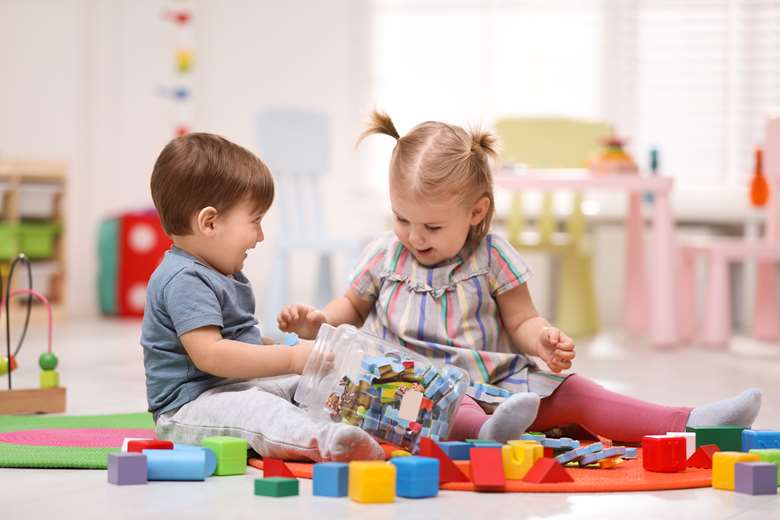The Leap to Kindergarten: Is Your Child Ready?
The first day of kindergarten marks a major milestone in every child’s life. As parents, we want to ensure our children are fully prepared – socially, emotionally, and academically – for this big transition.
At Crystals Childcare & Preschool, we understand both the excitement and anxiety surrounding this leap into “big kid” elementary school. That’s why our programs and curriculum focus specifically on kindergarten readiness skills to make sure your child puts their best foot forward from day one.
In this comprehensive guide, we’ll explore key readiness areas and provide actionable tips to lay the foundation for success in that pivotal first year of school.
Developing Social Skills & Emotional Intelligence
The social and collaborative nature of kindergarten makes emotional intelligence extremely important at this age. Kindergarteners participate in whole class instruction, small groups, pairs, learning stations and more. Appropriate interaction with teachers and peers provides the building blocks for future academic success.
At Crystals Childcare & Preschool, our childcare programs allow children to practice fundamental social skills like sharing, taking turns, using manners, expressing wants and needs verbally, and regulating behavior. Our small class sizes and low student-to-teacher ratios also let teachers provide ample one-on-one coaching to overcome shyness and separation anxiety.
You can reinforce these skills at home through peer play dates, family game time, and role playing various social situations. Building confidence and independence will help ease the nerves of entering a classroom.

Literacy Fundamentals: Reading & Writing Readiness
While formal reading instruction takes off in kindergarten, pre-literacy skills start developing in infancy through games like peekaboo that connect visual cues and language. By preschool, children’s burgeoning understanding of the alphabet, letter formation, letter sounds, rhyming patterns, and vocabulary/listening comprehension allows them to piece together and manipulate the building blocks of words and stories.
Our onsite literacy programs introduce age-appropriate children’s literature to nurture a love of reading. We also work on letter recognition, phonics, emergent writing, and fine motor control required for pencil grip.
You can lay the foundation for reading, writing, and listening at home through interactive story time, magnetic letters, coloring, tracing, journaling, singing, and rhyming games. Visit the library, allow your child to “write” notes or make birthday cards for relatives, and say silly tongue twisters to make pre-literacy fun.


Cultivating Curiosity & Thinking Skills
The kindergarten classroom feels like an wonderland, bursting with sights, sounds, and experiences that feed into a 5-year-old’s innate sense of curiosity. Self-directed, hands-on learning activities require students to tap into memory, creativity, problem solving, analysis, application, synthesis, and other higher order thinking abilities.
Our childcare curriculum aligns activities to state early learning standards across subjects which aim to strengthen cognitive, logical, and critical thinking over time. Our teachers ask open-ended questions and assign engaging projects that spark the imagination and make learning interactive. Field trips, music/movement, and arts/crafts also encourage whole-brain stimulation and idea generation.
You can spark curiosity and mental development at home too using everyday teachable moments – sorting laundry, baking, identifying wildlife on a walk. Engaging shows like Sesame Street, brainteaser games, and apps like Endless Alphabet reinforce emerging cognitive abilities while keeping kids enthralled.
Mathematics & STEM Exposure
Math instruction begins on day one of kindergarten, building on informal understandings of patterns, spatial relationships, sorting/classifying, numbers, counting, measurement, shapes, part-to-whole relationships and other concepts woven into preschool. Students enter kindergarten with varying competencies, so personalized assessment and differentiated teaching provide the right balance of challenge and mastery.
Our full-service childcare center designs math lessons and projects tailored to each age group’s developmental level based on state standards. We make abstract concepts concrete through manipulatives like counting bears, attribute blocks, links, pegboards, puzzles, balance scales, and more. Our STEM initiatives also introduce early engineering, reasoning, and problem solving skills essential for math comprehension.
You can reinforce mathematical thinking at home when cooking, doing laundry, using money, playing board games, building with blocks/LEGOs, arranging toys by size/type, practicing patterns, identifying shapes in everyday objects, and drawing sets of objects. Free apps like Khan Academy also help instill familiarity.
Self-Help: Potty Training, Hygiene & More
Kindergarteners handle personal care largely independently – using the restroom, proper hand hygiene, cleanliness, clothing themselves. Mastering these self-help milestones boosts confidence while allowing children to focus on classroom tasks versus care needs.
Our toddler curriculum introduces potty training when parents and teachers agree the child shows readiness signs – staying dry for extended periods, indicating discomfort in soiled/wet diapers, curiosity about the toilet, cessation of resistance when prompted to try. We take a relaxed, low-pressure approach customized to the child’s temperament and developmental pace.
For older children, we reinforce personal responsibility habits aligned to state health standards – proper hand washing technique, oral health through brushing, tissue usage, dressing themselves, and responsible bathroom behavior. Your partnership in establishing routines at home creates continuity between our center and your household.
Modeling self-care, allowing practice at home, using encouraging language, employing rewards or celebratory rituals like special underwear can make mastery more exciting. Consider sending an extra set of clothes as accidents do happen during this transition process.




The Gift of Time: Allow Typical Kindergarten Adjustment
While ensuring readiness across domains, remember children can take upwards of six weeks to adjust to the kindergarten classroom setting and schedule. Dramatic play and unstructured time diminish to make room for teacher-led instruction. Expect behavior fluctuation as students find their footing.
Rome wasn’t built in a day. Trust it takes time to apply the knowledge and skills your child gains in preschool to elementary school. Kindergarten teachers are trained to assess each student’s abilities within the first months in order to individualize instruction accordingly. Progress might feel slow initially.
You can ease uncertainty by allowing your child to visit the kindergarten classroom and meet the teachers before school starts. Having one familiar face on that first day can make a world of difference when navigating a new environment.
As seasoned early childhood educators and caregivers, the team at Crystals Childcare & Preschool wants to impart all we know to ready your child for the adventure ahead. Our comprehensive curriculum, devoted teachers, and supportive environment all work together to foster emerging independence for the transition into kindergarten and beyond.
We Invite You to Learn More
As you can see, early learning plays a profound role in laying the foundation for achievement throughout a child’s educational journey. Our center would love the opportunity to nurture your child’s growth during these precious developmental years.
Please reach out at (432) 687-5904 info@crystalschildcare.org to learn more about our programs, schedule a tour at our state-of-the-art Midland facility, or discuss any questions you might have. Our team looks forward to welcoming your family into our Crystals Childcare & Preschool family!

